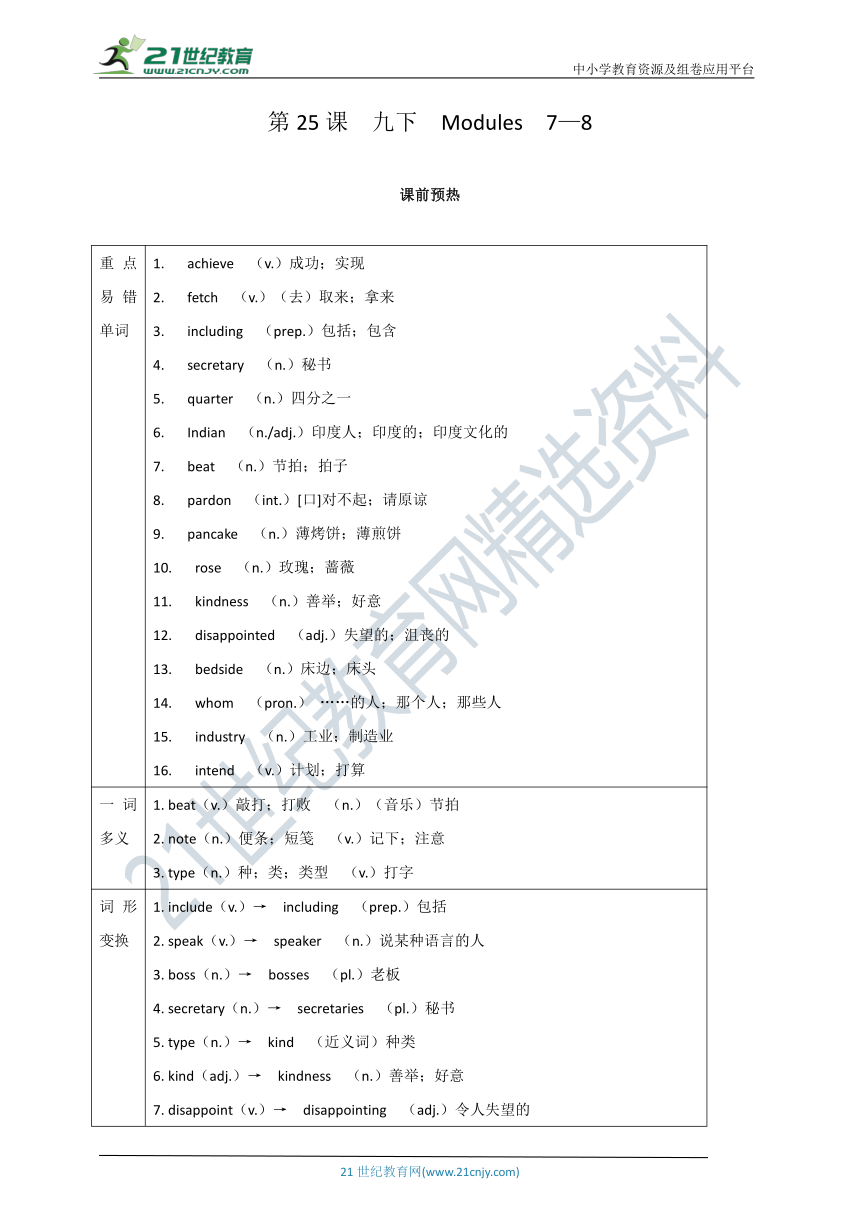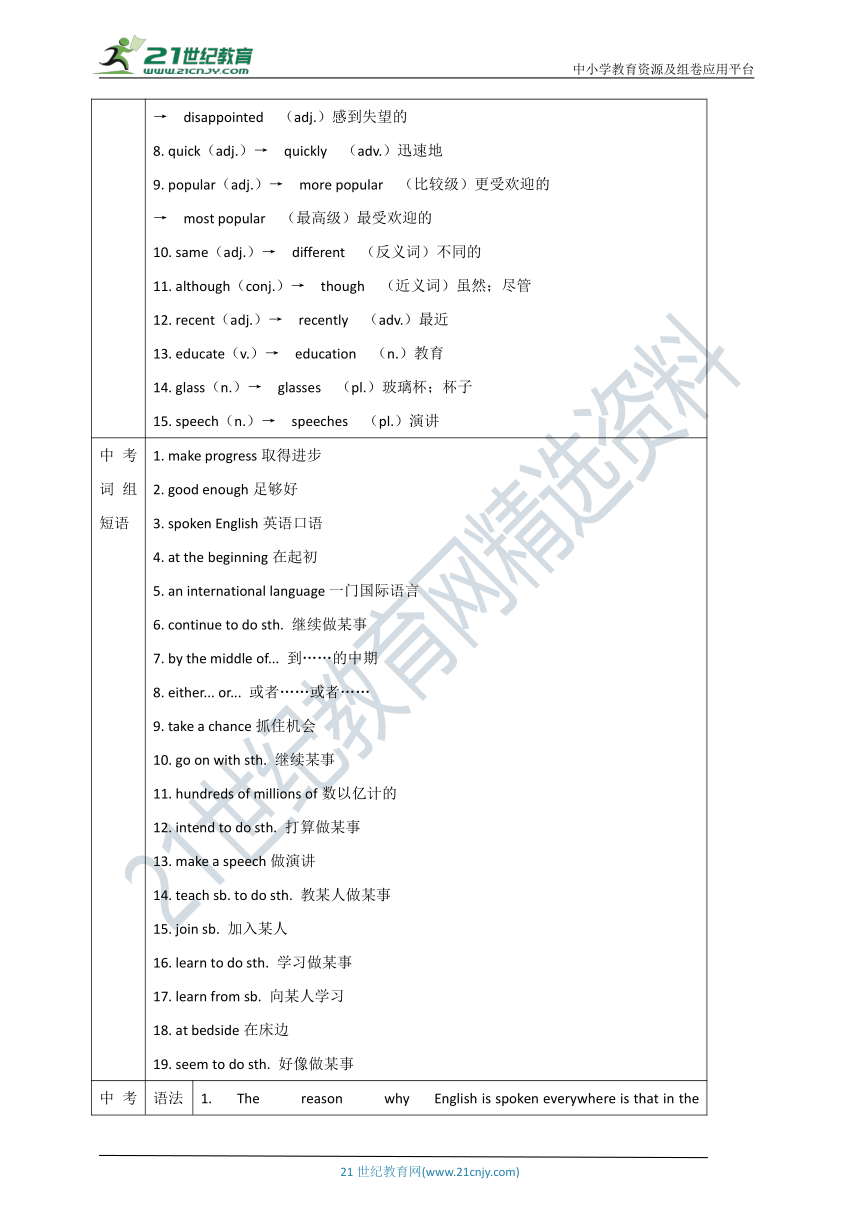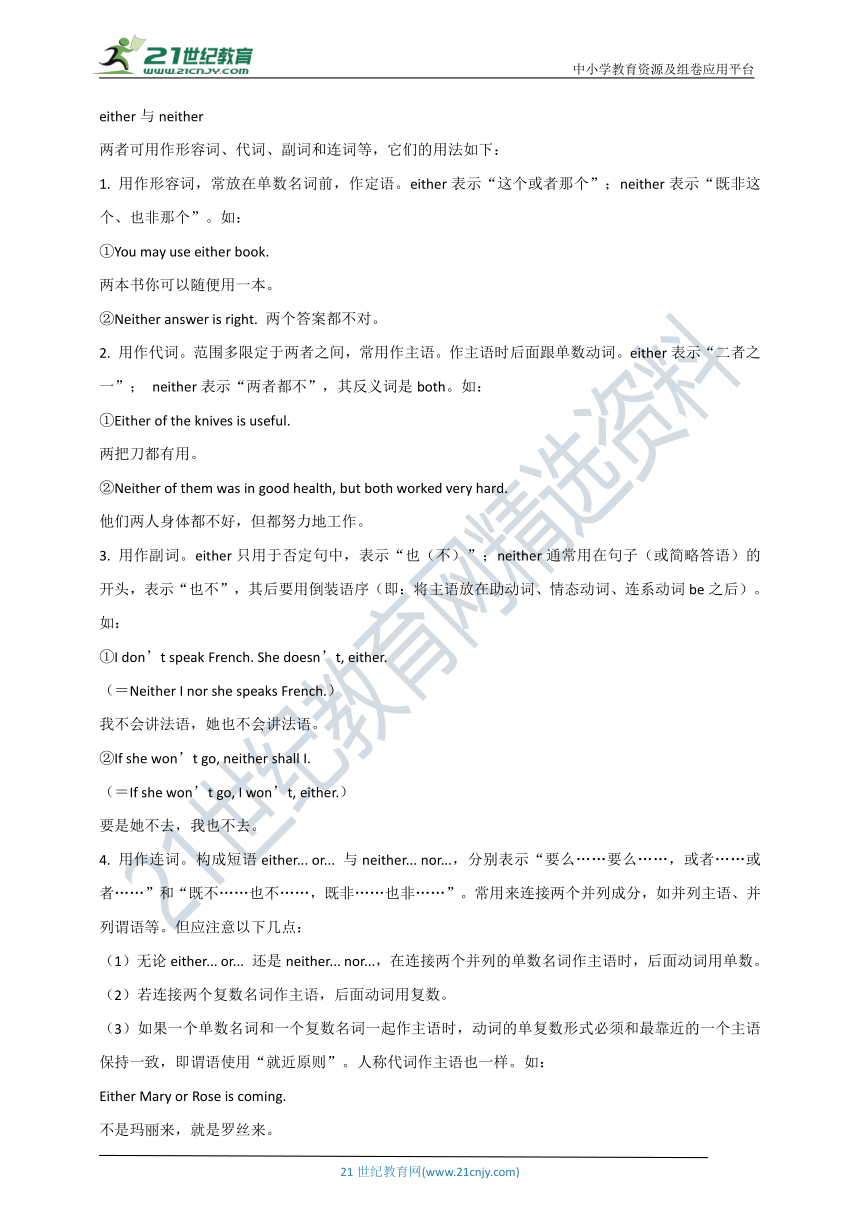外研版英语中考语言基础知识梳理与训练 第25课九年级下册 Modules 7—8
文档属性
| 名称 | 外研版英语中考语言基础知识梳理与训练 第25课九年级下册 Modules 7—8 |  | |
| 格式 | doc | ||
| 文件大小 | 1.3MB | ||
| 资源类型 | 试卷 | ||
| 版本资源 | 外研版 | ||
| 科目 | 英语 | ||
| 更新时间 | 2022-02-06 18:56:03 | ||
图片预览





文档简介
中小学教育资源及组卷应用平台
第25课 九下 Modules 7—8
课前预热
重点易错单词 1. achieve (v.)成功;实现2. fetch (v.)(去)取来;拿来3. including (prep.)包括;包含4. secretary (n.)秘书5. quarter (n.)四分之一6. Indian (n./adj.)印度人;印度的;印度文化的7. beat (n.)节拍;拍子8. pardon (int.)[口]对不起;请原谅9. pancake (n.)薄烤饼;薄煎饼10. rose (n.)玫瑰;蔷薇11. kindness (n.)善举;好意12. disappointed (adj.)失望的;沮丧的13. bedside (n.)床边;床头14. whom (pron.) ……的人;那个人;那些人15. industry (n.)工业;制造业16. intend (v.)计划;打算
一词多义 1. beat(v.)敲打;打败 (n.)(音乐)节拍2. note(n.)便条;短笺 (v.)记下;注意3. type(n.)种;类;类型 (v.)打字
词形变换 1. include(v.)→ including (prep.)包括2. speak(v.)→ speaker (n.)说某种语言的人3. boss(n.)→ bosses (pl.)老板4. secretary(n.)→ secretaries (pl.)秘书5. type(n.)→ kind (近义词)种类6. kind(adj.)→ kindness (n.)善举;好意7. disappoint(v.)→ disappointing (adj.)令人失望的→ disappointed (adj.)感到失望的8. quick(adj.)→ quickly (adv.)迅速地9. popular(adj.)→ more popular (比较级)更受欢迎的→ most popular (最高级)最受欢迎的10. same(adj.)→ different (反义词)不同的11. although(conj.)→ though (近义词)虽然;尽管12. recent(adj.)→ recently (adv.)最近13. educate(v.)→ education (n.)教育14. glass(n.)→ glasses (pl.)玻璃杯;杯子15. speech(n.)→ speeches (pl.)演讲
中考词组短语 1. make progress取得进步2. good enough足够好3. spoken English英语口语4. at the beginning在起初5. an international language一门国际语言6. continue to do sth. 继续做某事7. by the middle of... 到……的中期8. either... or... 或者……或者……9. take a chance抓住机会10. go on with sth. 继续某事11. hundreds of millions of数以亿计的 12. intend to do sth. 打算做某事13. make a speech做演讲14. teach sb. to do sth. 教某人做某事15. join sb. 加入某人16. learn to do sth. 学习做某事17. learn from sb. 向某人学习18. at bedside在床边19. seem to do sth. 好像做某事
中考句型回顾 语法句型 1. The reason why English is spoken everywhere is that in the nineteenth century, English became the language of world trade.英语被广泛使用的原因是,在十九世纪,英语变成了世界贸易语言。2. Even though we speak different types of English, we are all part of an international club.即使我们说不同种类的英语,我们都是国际俱乐部的一部分。3. Even if I go back to the UK, I’ll comeback and visit you all .即使我回到英国,我也将回来看你们大家。4. As China continues to grow, many people think that Chinese will become as common as English. 随着中国的不断强大,许多人认为中文将变得和英语一样的普遍。5. Toby seems not to be as interested in schoolwork as he is in sport.托比似乎对学业不如对体育那么感兴趣。6. My teachers taught me that there is no success without effort .我的老师们教导我,没有努力就没有成功。7. I’m sure that you all have your own memories about the last three years.我相信关于过去的三年,你们都有你们自己的回忆。
功能句型 1. 语言和文化:①But if you keep trying , you can make progress quickly and find a lot of fun in learning it. 但是如果你不断努力,你很快会取得进步并发现学习它很有趣。② It is also important to know that English has borrowed many words from other languages.知道英语从其他语言中借用了很多单词也是很重要的。③If you work hard, you can improve your handwriting.如果你努力学习,你就能提高你的书写能力。④There are a lot of good websites which/that you can learn from .有很多很好的网站你可以从中学习。2. 学校生活:①I don’t know when we’ll be back in this hall together again. I’m going to miss you all.我不知道我们会在什么时候再次一起回到这个大厅。我会想念你们大家的。②I still can’t run fast enough , but I’ve learnt to try my best, not only with running but also with whatever else I do.我仍然跑得不够快,但是我学会了要尽我最大的努力,不仅是在跑步上,而且在我做的其他任何事情上。
课堂突破
中考重点词汇精析
一、either
单词解析
1. pron. (两者中的)任何一个;(两者中的)每个,各方。如:
You can keep one of the photos. Either of them─whichever you like. 你可以保留一张照片。两张里任选一张——拣你喜欢的。
2. adv. (用于否定词组后)也。如:
Pete can’t go and I can’t either.
皮特不能去,我也不能。
辨异突破
either与neither
两者可用作形容词、代词、副词和连词等,它们的用法如下:
1. 用作形容词,常放在单数名词前,作定语。either表示“这个或者那个”;neither表示“既非这个、也非那个”。如:
①You may use either book.
两本书你可以随便用一本。
②Neither answer is right. 两个答案都不对。
2. 用作代词。范围多限定于两者之间,常用作主语。作主语时后面跟单数动词。either表示“二者之一”; neither表示“两者都不”,其反义词是both。如:
①Either of the knives is useful.
两把刀都有用。
②Neither of them was in good health, but both worked very hard.
他们两人身体都不好,但都努力地工作。
3. 用作副词。either只用于否定句中,表示“也(不)”;neither通常用在句子(或简略答语)的开头,表示“也不”,其后要用倒装语序(即:将主语放在助动词、情态动词、连系动词be之后)。如:
①I don’t speak French. She doesn’t, either.
(=Neither I nor she speaks French.)
我不会讲法语,她也不会讲法语。
②If she won’t go, neither shall I.
(=If she won’t go, I won’t, either.)
要是她不去,我也不去。
4. 用作连词。构成短语either... or... 与neither... nor...,分别表示“要么……要么……,或者……或者……”和“既不……也不……,既非……也非……”。常用来连接两个并列成分,如并列主语、并列谓语等。但应注意以下几点:
(1)无论either... or... 还是neither... nor...,在连接两个并列的单数名词作主语时,后面动词用单数。
(2)若连接两个复数名词作主语,后面动词用复数。
(3)如果一个单数名词和一个复数名词一起作主语时,动词的单复数形式必须和最靠近的一个主语保持一致,即谓语使用“就近原则”。人称代词作主语也一样。如:
Either Mary or Rose is coming.
不是玛丽来,就是罗丝来。
活学活用
根据句意,用所给词的适当形式填空或选词填空。
1. Neither Lily nor Lucy_________________ (be) here.
2. I can’t sing English songs,_________________ (either/neither).
3. Tom isn’t a teacher, and_________________ (either/neither) is Mary.
4. Either you or he_________________ (have) to tidy up the classroom.
5. I’m invited to the party and John is_________________ (also/either) invited.
6. Either Jane or I_________________ (go) to the supermarket every Wednesday.
7. You need to go shopping and I need to go shopping_________________ (as/either) well.
8. I didn’t expect to do well in_________________ (either/neither) maths or geography.
9. I don’t like eating fruit or vegetables, and_______________ (either/neither) does my sister.
10. My father can’t go on vacation, and_________________(either/neither) can my mother, because my grandma is ill.
二、fetch
单词解析
v. (去)拿来;(去)请来。如:
The inhabitants have to walk a mile to fetch water. 居民得走一英里路去取水。
辨异突破
carry, bring, take与fetch
这四个词都含有“拿;带”的意思,但用法有所不同。
1. carry意为“(随身)携带;搬运”,强调某物从甲地移至乙地,但没有方向性。如:
Can you help me carry the heavy bag
你能帮我搬一下这个很重的包吗?
2. bring意为“拿来;带来”,指把某人或某物从别处带到说话人所处的地方。如:
Please remember to bring your homework here tomorrow. 记得明天把你的作业带来。
3. take意为“拿去;带去”,指把某物或某人从说话人所处的地方带到别处,离开说话人,与bring相反。如:
Please take the letter to the post office.
请把这封信送到邮局去。
4. fetch意为“取来”,相当于get,表示到某地去把某物取来。如:
Please wait a minute. He’s just gone out to fetch some water.
请等一会儿。他刚出去打水了。
活学活用
用carry, bring, take或fetch的适当形式填空。
1._________________ me the book on the desk!
2. Will you_________________ her to the library
3. I’m going home to_________________ my book.
4. She always_________________ a dictionary with her.
5. Take away the apple, and_________________ me a pear.
6. The man_________________ the boy on his back just now.
7. He_________________ the children from school ten minutes ago.
8. Father_________________ me a present from Australia last week. I like it a lot.
中考重点句型精析
Toby seems not as interested in school-work as he is in sport. 托比对学业似乎不如对体育那么感兴趣。
句型解析
seem可作连系动词或不及物动词,意为“似乎;好像”,其常见用法现归纳如下:
1. “主语+seem+(to be)+表语”,表语多为名词或形容词,有时是其他的词或短语,以说明主语的特征或状态。如:
①Tom seems (to be) a very clever boy.
汤姆看上去是一个非常聪明的男孩。(名词作表语)
②Mr Black seemed (to be) quite happy.
布莱克先生好像十分快乐。(形容词作表语)
2. “主语+seem+不定式”,此句型中的seem与不定式一起构成复合谓语。如:
①Mrs Green doesn’t seem (或seems not) to like the idea.
格林夫人似乎不太喜欢这个主意。
②The children seemed to be eating something in the room.
孩子们好像正在房间里吃东西呢。
③The young man seemed to have changed much. 这个年轻人似乎变化很大。
3. “It seems+that从句”,其中it是形式主语,that引导主语从句。如:
①It seems that no one knows what has happened in the park.
似乎没有人知道公园里发生了什么事。
②It seems to me that Mr Brown will not come again.
在我看来,布朗先生不会再来了。
4. “There+seem to be+名词”,其中to be可省略。seem的单复数形式要根据后面作主语的名词的单复数形式而定。如:
①There doesn’t seem (to be) much hope of our beating that team.
看来我们战胜那个队没有多大希望。
②There seems (to be) no need to wait any longer. 看来没有再等的必要了。
5. “It seems/seemed+as if从句”。如:
①It seems as if he were in a dream.
看来他像是在做梦。
②It seemed as if the good man were trying to teach us all he knew in this last lesson.
这个好心人仿佛要在最后这一堂课上把他的全部知识教给我们。
活学活用
填入适当的词或用所给词的适当形式填空。
1. It seems_________________ she is happy.
2. The little boy seems_________________ (cry).
3. The man over there seems_________________ (be) a new teacher.
4. He seemed_________________ honest man.
5._________________ seems to be no work for you to do now.
6. It seemed as_________________ no one knew what had happened.
当堂检测
一、选词填空
用方框中所给词语的适当形式填空。每词限用一次。
intend disappoint laugh at whom boss
1. He asked me with_________________ I had discussed it.
2. Many_________________ made their workers work for twelve hours in the past.
3. I_________________ to go to Hainan Island for my holiday this summer.
4. She was_________________ that she failed the Chinese exam.
5. It’s impolite to_________________ others when they are in trouble.
二、单词拼写
1. Look! There are some_________________ (玫瑰) on the desk.
2. Listen! The piece of music has great_________________(节拍).
3. Could you please_________________ (去取来) me my bag
4. You can park on_________________ (任何一个) side of the street.
5. Finally he_________________ (实现) success. We are all proud of him.
6. The old man left a_________________ (便条) and went to the supermarket.
7. It’s a_________________ (一刻钟) to four now─let’s get ready for the meeting.
8. Some day I will reciprocate your great_________________ (善举;好意) to me.
9. A hundred people died in the air crash,_________________(包括) three Americans.
10. The South American_________________ (印第安人) first cooked and ate potatoes over two thousand years ago.
三、语法填空
阅读下面短文,在空白处填入一个适当的词,或填入括号中所给单词的正确形式。
At the end of the term, our ethics(伦理学) professor gave us a test. He had told us 1_________________(expect) one and had warned us it would be included in the final grade.
The test began. Sure enough, I was 2_________________confident that I finished all the questions after forty 3_________________(minute) except the very last one: What is the name of the woman who cleans the lecture hall
I thought it was 4_________________ joke. I’d seen the woman many times. She’d been working in the building for at least a year. She was short 5_________________ dark hair, in her fifties, and we’d even smiled at each other once or twice. But I didn’t know 6_________________(she) name because I’d never thought to ask her. I handed in my test paper and the last question 7_________________(leave) unanswered—hoping the final result wouldn’t be influenced too 8_________________(bad) because of it. But then one student put up his hand. He hadn’t finished the test, 9_________________. “I’m just wondering,” he said. “Will it really change my grade if I don’t complete that question ”
“Certainly,” our professor 10_________________(smile). “In your future jobs, ...”
I’ve never forgotten that lesson. I also learnt that the cleaner’s name was Sherry.
参考答案
第25课 九下 Modules 7—8
课堂突破
【中考重点词汇精析】
一、1. is 2. either 3. neither 4. has 5. also 6. go 7. as
8. either 9. neither 10. neither
二、1. Fetch 2. take 3. fetch 4. takes 5. bring 6. carried
7. fetched 8. brought
【中考重点句型精析】
1. that 2. to cry 3. to be 4. an 5. There 6. if
当堂检测
一、1. whom 2. bosses 3. intend 4. disappointed 5. laugh at
二、1. roses 2. beats 3. fetch 4. either 5. achieved 6. note
7. quarter 8. kindness 9. including 10. Indians
三、1. to expect 2. so 3. minutes 4. a 5. with 6. her
7. was left 8. badly 9. either 10. smiled
21世纪教育网 www.21cnjy.com 精品试卷·第 2 页 (共 2 页)
HYPERLINK "http://21世纪教育网(www.21cnjy.com)
" 21世纪教育网(www.21cnjy.com)
第25课 九下 Modules 7—8
课前预热
重点易错单词 1. achieve (v.)成功;实现2. fetch (v.)(去)取来;拿来3. including (prep.)包括;包含4. secretary (n.)秘书5. quarter (n.)四分之一6. Indian (n./adj.)印度人;印度的;印度文化的7. beat (n.)节拍;拍子8. pardon (int.)[口]对不起;请原谅9. pancake (n.)薄烤饼;薄煎饼10. rose (n.)玫瑰;蔷薇11. kindness (n.)善举;好意12. disappointed (adj.)失望的;沮丧的13. bedside (n.)床边;床头14. whom (pron.) ……的人;那个人;那些人15. industry (n.)工业;制造业16. intend (v.)计划;打算
一词多义 1. beat(v.)敲打;打败 (n.)(音乐)节拍2. note(n.)便条;短笺 (v.)记下;注意3. type(n.)种;类;类型 (v.)打字
词形变换 1. include(v.)→ including (prep.)包括2. speak(v.)→ speaker (n.)说某种语言的人3. boss(n.)→ bosses (pl.)老板4. secretary(n.)→ secretaries (pl.)秘书5. type(n.)→ kind (近义词)种类6. kind(adj.)→ kindness (n.)善举;好意7. disappoint(v.)→ disappointing (adj.)令人失望的→ disappointed (adj.)感到失望的8. quick(adj.)→ quickly (adv.)迅速地9. popular(adj.)→ more popular (比较级)更受欢迎的→ most popular (最高级)最受欢迎的10. same(adj.)→ different (反义词)不同的11. although(conj.)→ though (近义词)虽然;尽管12. recent(adj.)→ recently (adv.)最近13. educate(v.)→ education (n.)教育14. glass(n.)→ glasses (pl.)玻璃杯;杯子15. speech(n.)→ speeches (pl.)演讲
中考词组短语 1. make progress取得进步2. good enough足够好3. spoken English英语口语4. at the beginning在起初5. an international language一门国际语言6. continue to do sth. 继续做某事7. by the middle of... 到……的中期8. either... or... 或者……或者……9. take a chance抓住机会10. go on with sth. 继续某事11. hundreds of millions of数以亿计的 12. intend to do sth. 打算做某事13. make a speech做演讲14. teach sb. to do sth. 教某人做某事15. join sb. 加入某人16. learn to do sth. 学习做某事17. learn from sb. 向某人学习18. at bedside在床边19. seem to do sth. 好像做某事
中考句型回顾 语法句型 1. The reason why English is spoken everywhere is that in the nineteenth century, English became the language of world trade.英语被广泛使用的原因是,在十九世纪,英语变成了世界贸易语言。2. Even though we speak different types of English, we are all part of an international club.即使我们说不同种类的英语,我们都是国际俱乐部的一部分。3. Even if I go back to the UK, I’ll comeback and visit you all .即使我回到英国,我也将回来看你们大家。4. As China continues to grow, many people think that Chinese will become as common as English. 随着中国的不断强大,许多人认为中文将变得和英语一样的普遍。5. Toby seems not to be as interested in schoolwork as he is in sport.托比似乎对学业不如对体育那么感兴趣。6. My teachers taught me that there is no success without effort .我的老师们教导我,没有努力就没有成功。7. I’m sure that you all have your own memories about the last three years.我相信关于过去的三年,你们都有你们自己的回忆。
功能句型 1. 语言和文化:①But if you keep trying , you can make progress quickly and find a lot of fun in learning it. 但是如果你不断努力,你很快会取得进步并发现学习它很有趣。② It is also important to know that English has borrowed many words from other languages.知道英语从其他语言中借用了很多单词也是很重要的。③If you work hard, you can improve your handwriting.如果你努力学习,你就能提高你的书写能力。④There are a lot of good websites which/that you can learn from .有很多很好的网站你可以从中学习。2. 学校生活:①I don’t know when we’ll be back in this hall together again. I’m going to miss you all.我不知道我们会在什么时候再次一起回到这个大厅。我会想念你们大家的。②I still can’t run fast enough , but I’ve learnt to try my best, not only with running but also with whatever else I do.我仍然跑得不够快,但是我学会了要尽我最大的努力,不仅是在跑步上,而且在我做的其他任何事情上。
课堂突破
中考重点词汇精析
一、either
单词解析
1. pron. (两者中的)任何一个;(两者中的)每个,各方。如:
You can keep one of the photos. Either of them─whichever you like. 你可以保留一张照片。两张里任选一张——拣你喜欢的。
2. adv. (用于否定词组后)也。如:
Pete can’t go and I can’t either.
皮特不能去,我也不能。
辨异突破
either与neither
两者可用作形容词、代词、副词和连词等,它们的用法如下:
1. 用作形容词,常放在单数名词前,作定语。either表示“这个或者那个”;neither表示“既非这个、也非那个”。如:
①You may use either book.
两本书你可以随便用一本。
②Neither answer is right. 两个答案都不对。
2. 用作代词。范围多限定于两者之间,常用作主语。作主语时后面跟单数动词。either表示“二者之一”; neither表示“两者都不”,其反义词是both。如:
①Either of the knives is useful.
两把刀都有用。
②Neither of them was in good health, but both worked very hard.
他们两人身体都不好,但都努力地工作。
3. 用作副词。either只用于否定句中,表示“也(不)”;neither通常用在句子(或简略答语)的开头,表示“也不”,其后要用倒装语序(即:将主语放在助动词、情态动词、连系动词be之后)。如:
①I don’t speak French. She doesn’t, either.
(=Neither I nor she speaks French.)
我不会讲法语,她也不会讲法语。
②If she won’t go, neither shall I.
(=If she won’t go, I won’t, either.)
要是她不去,我也不去。
4. 用作连词。构成短语either... or... 与neither... nor...,分别表示“要么……要么……,或者……或者……”和“既不……也不……,既非……也非……”。常用来连接两个并列成分,如并列主语、并列谓语等。但应注意以下几点:
(1)无论either... or... 还是neither... nor...,在连接两个并列的单数名词作主语时,后面动词用单数。
(2)若连接两个复数名词作主语,后面动词用复数。
(3)如果一个单数名词和一个复数名词一起作主语时,动词的单复数形式必须和最靠近的一个主语保持一致,即谓语使用“就近原则”。人称代词作主语也一样。如:
Either Mary or Rose is coming.
不是玛丽来,就是罗丝来。
活学活用
根据句意,用所给词的适当形式填空或选词填空。
1. Neither Lily nor Lucy_________________ (be) here.
2. I can’t sing English songs,_________________ (either/neither).
3. Tom isn’t a teacher, and_________________ (either/neither) is Mary.
4. Either you or he_________________ (have) to tidy up the classroom.
5. I’m invited to the party and John is_________________ (also/either) invited.
6. Either Jane or I_________________ (go) to the supermarket every Wednesday.
7. You need to go shopping and I need to go shopping_________________ (as/either) well.
8. I didn’t expect to do well in_________________ (either/neither) maths or geography.
9. I don’t like eating fruit or vegetables, and_______________ (either/neither) does my sister.
10. My father can’t go on vacation, and_________________(either/neither) can my mother, because my grandma is ill.
二、fetch
单词解析
v. (去)拿来;(去)请来。如:
The inhabitants have to walk a mile to fetch water. 居民得走一英里路去取水。
辨异突破
carry, bring, take与fetch
这四个词都含有“拿;带”的意思,但用法有所不同。
1. carry意为“(随身)携带;搬运”,强调某物从甲地移至乙地,但没有方向性。如:
Can you help me carry the heavy bag
你能帮我搬一下这个很重的包吗?
2. bring意为“拿来;带来”,指把某人或某物从别处带到说话人所处的地方。如:
Please remember to bring your homework here tomorrow. 记得明天把你的作业带来。
3. take意为“拿去;带去”,指把某物或某人从说话人所处的地方带到别处,离开说话人,与bring相反。如:
Please take the letter to the post office.
请把这封信送到邮局去。
4. fetch意为“取来”,相当于get,表示到某地去把某物取来。如:
Please wait a minute. He’s just gone out to fetch some water.
请等一会儿。他刚出去打水了。
活学活用
用carry, bring, take或fetch的适当形式填空。
1._________________ me the book on the desk!
2. Will you_________________ her to the library
3. I’m going home to_________________ my book.
4. She always_________________ a dictionary with her.
5. Take away the apple, and_________________ me a pear.
6. The man_________________ the boy on his back just now.
7. He_________________ the children from school ten minutes ago.
8. Father_________________ me a present from Australia last week. I like it a lot.
中考重点句型精析
Toby seems not as interested in school-work as he is in sport. 托比对学业似乎不如对体育那么感兴趣。
句型解析
seem可作连系动词或不及物动词,意为“似乎;好像”,其常见用法现归纳如下:
1. “主语+seem+(to be)+表语”,表语多为名词或形容词,有时是其他的词或短语,以说明主语的特征或状态。如:
①Tom seems (to be) a very clever boy.
汤姆看上去是一个非常聪明的男孩。(名词作表语)
②Mr Black seemed (to be) quite happy.
布莱克先生好像十分快乐。(形容词作表语)
2. “主语+seem+不定式”,此句型中的seem与不定式一起构成复合谓语。如:
①Mrs Green doesn’t seem (或seems not) to like the idea.
格林夫人似乎不太喜欢这个主意。
②The children seemed to be eating something in the room.
孩子们好像正在房间里吃东西呢。
③The young man seemed to have changed much. 这个年轻人似乎变化很大。
3. “It seems+that从句”,其中it是形式主语,that引导主语从句。如:
①It seems that no one knows what has happened in the park.
似乎没有人知道公园里发生了什么事。
②It seems to me that Mr Brown will not come again.
在我看来,布朗先生不会再来了。
4. “There+seem to be+名词”,其中to be可省略。seem的单复数形式要根据后面作主语的名词的单复数形式而定。如:
①There doesn’t seem (to be) much hope of our beating that team.
看来我们战胜那个队没有多大希望。
②There seems (to be) no need to wait any longer. 看来没有再等的必要了。
5. “It seems/seemed+as if从句”。如:
①It seems as if he were in a dream.
看来他像是在做梦。
②It seemed as if the good man were trying to teach us all he knew in this last lesson.
这个好心人仿佛要在最后这一堂课上把他的全部知识教给我们。
活学活用
填入适当的词或用所给词的适当形式填空。
1. It seems_________________ she is happy.
2. The little boy seems_________________ (cry).
3. The man over there seems_________________ (be) a new teacher.
4. He seemed_________________ honest man.
5._________________ seems to be no work for you to do now.
6. It seemed as_________________ no one knew what had happened.
当堂检测
一、选词填空
用方框中所给词语的适当形式填空。每词限用一次。
intend disappoint laugh at whom boss
1. He asked me with_________________ I had discussed it.
2. Many_________________ made their workers work for twelve hours in the past.
3. I_________________ to go to Hainan Island for my holiday this summer.
4. She was_________________ that she failed the Chinese exam.
5. It’s impolite to_________________ others when they are in trouble.
二、单词拼写
1. Look! There are some_________________ (玫瑰) on the desk.
2. Listen! The piece of music has great_________________(节拍).
3. Could you please_________________ (去取来) me my bag
4. You can park on_________________ (任何一个) side of the street.
5. Finally he_________________ (实现) success. We are all proud of him.
6. The old man left a_________________ (便条) and went to the supermarket.
7. It’s a_________________ (一刻钟) to four now─let’s get ready for the meeting.
8. Some day I will reciprocate your great_________________ (善举;好意) to me.
9. A hundred people died in the air crash,_________________(包括) three Americans.
10. The South American_________________ (印第安人) first cooked and ate potatoes over two thousand years ago.
三、语法填空
阅读下面短文,在空白处填入一个适当的词,或填入括号中所给单词的正确形式。
At the end of the term, our ethics(伦理学) professor gave us a test. He had told us 1_________________(expect) one and had warned us it would be included in the final grade.
The test began. Sure enough, I was 2_________________confident that I finished all the questions after forty 3_________________(minute) except the very last one: What is the name of the woman who cleans the lecture hall
I thought it was 4_________________ joke. I’d seen the woman many times. She’d been working in the building for at least a year. She was short 5_________________ dark hair, in her fifties, and we’d even smiled at each other once or twice. But I didn’t know 6_________________(she) name because I’d never thought to ask her. I handed in my test paper and the last question 7_________________(leave) unanswered—hoping the final result wouldn’t be influenced too 8_________________(bad) because of it. But then one student put up his hand. He hadn’t finished the test, 9_________________. “I’m just wondering,” he said. “Will it really change my grade if I don’t complete that question ”
“Certainly,” our professor 10_________________(smile). “In your future jobs, ...”
I’ve never forgotten that lesson. I also learnt that the cleaner’s name was Sherry.
参考答案
第25课 九下 Modules 7—8
课堂突破
【中考重点词汇精析】
一、1. is 2. either 3. neither 4. has 5. also 6. go 7. as
8. either 9. neither 10. neither
二、1. Fetch 2. take 3. fetch 4. takes 5. bring 6. carried
7. fetched 8. brought
【中考重点句型精析】
1. that 2. to cry 3. to be 4. an 5. There 6. if
当堂检测
一、1. whom 2. bosses 3. intend 4. disappointed 5. laugh at
二、1. roses 2. beats 3. fetch 4. either 5. achieved 6. note
7. quarter 8. kindness 9. including 10. Indians
三、1. to expect 2. so 3. minutes 4. a 5. with 6. her
7. was left 8. badly 9. either 10. smiled
21世纪教育网 www.21cnjy.com 精品试卷·第 2 页 (共 2 页)
HYPERLINK "http://21世纪教育网(www.21cnjy.com)
" 21世纪教育网(www.21cnjy.com)
